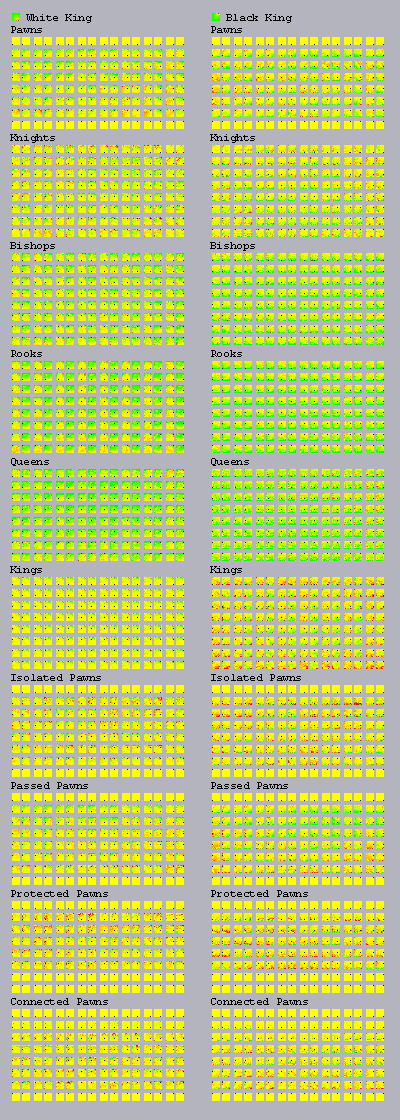Nope ruled that out. I downloaded Leorik-2.4 (again) and it has the exact same behavior. There is definitely a serious bug and it looks like a TT bug. In this position I'm looking at.Mike Sherwin wrote: ↑Fri Apr 07, 2023 4:02 pmIt could be that my downloaded copy is corrupt. If it is that would be a first.
5k2/R7/4K1p1/5PPp/7P/8/2r5/8 b - - 0 86
Both Leorik-2.4 and Leorik.KiSS evaluate the position as 0.00 and gives no pv. It just looks like a TT bug.
Leorik-2.4:
1 00:00 31 31k -4.82 Rc2-e2+
2 00:00 61 61k -4.72 Rc2-e2+ Ke6-f6
3 00:00 206 206k -4.99 Rc2-e2+ Ke6-f6 g6xf5
4 00:00 561 561k 0.00 Kf8-g8
5 00:00 617 617k 0.00 Kf8-g8
6 00:00 673 673k 0.00 Kf8-g8
7 00:00 773 773k 0.00 Kf8-g8
8 00:00 866 866k 0.00 Kf8-g8
9 00:00 1k 1,316k 0.00 Kf8-g8
10 00:00 2k 1,710k 0.00 Kf8-g8
11 00:00 2k 2,416k 0.00 Kf8-g8
12 00:00 3k 3,005k 0.00 Kf8-g8
13 00:00 4k 3,970k 0.00 Kf8-g8
14 00:00 5k 4,741k 0.00 Kf8-g8
15 00:00 6k 6,226k 0.00 Kf8-g8
16 00:00 8k 7,538k 0.00 Kf8-g8
17 00:00 11k 5,297k 0.00 Kf8-g8
18 00:00 13k 6,627k 0.00 Kf8-g8
19 00:00 18k 6,030k 0.00 Kf8-g8
20 00:00 22k 5,444k 0.00 Kf8-g8
21 00:00 28k 5,522k 0.00 Kf8-g8
22 00:00 32k 4,565k 0.00 Kf8-g8
23 00:00 40k 4,429k 0.00 Kf8-g8
24 00:00 46k 4,199k 0.00 Kf8-g8
25 00:00 60k 4,276k 0.00 Kf8-g8
26 00:00 70k 4,116k 0.00 Kf8-g8
27 00:00 91k 4,121k 0.00 Kf8-g8
28 00:00 116k 4,155k 0.00 Kf8-g8
29 00:00 137k 4,024k 0.00 Kf8-g8
30 00:00 159k 3,796k 0.00 Kf8-g8
31 00:00 197k 3,708k 0.00 Kf8-g8
32 00:00 230k 3,546k 0.00 Kf8-g8
33 00:00 299k 3,436k 0.00 Kf8-g8
34 00:00 360k 3,361k 0.00 Kf8-g8
35 00:00 538k 3,517k 0.00 Kf8-g8
36 00:00 717k 3,515k 0.00 Kf8-g8
37 00:00 1,281k 3,702k 0.00 Kf8-g8
38 00:00 1,805k 3,729k 0.00 Kf8-g8
39 00:00 2,759k 3,822k 0.00 Kf8-g8
40 00:01 4,330k 3,866k 0.00 Kf8-g8
41 00:02 8,165k 3,952k 0.00 Kf8-g8
42 00:03 13,946k 4,020k 0.00 Kf8-g8
43 00:05 22,642k 4,044k 0.00 Kf8-g8
44 00:08 32,804k 4,065k 0.00 Kf8-g8
45 00:12 51,826k 4,051k 0.00 Kf8-g8
46 00:21 88,022k 4,085k 0.00 Kf8-g8
47 00:33 137,341k 4,087k 0.00 Kf8-g8
48 00:48 197,510k 4,113k 0.00 Kf8-g8
49 01:13 300,689k 4,116k 0.00 Kf8-g8
50 01:46 444,706k 4,160k 0.00 Kf8-g8

